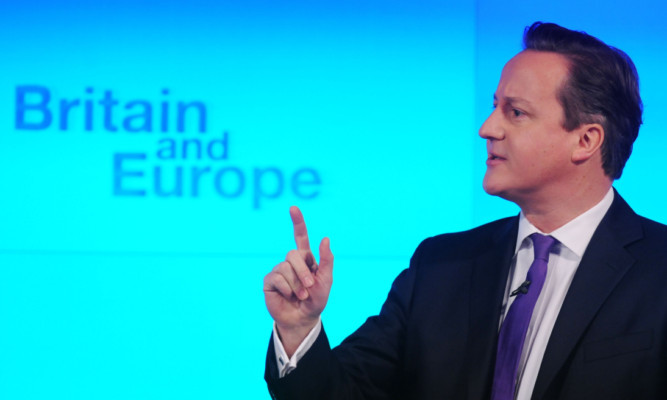Prime Minister David Cameron’s promise of an in/out referendum on Britain’s membership of the European Union sparked a furious political row in Westminster today.
Liberal Democrats said it was not in the national interest, and Labour accused him of “running scared” of the UK Independence Party (Ukip) and his own backbenchers.
In a high-profile speech in London this morning, the Prime Minister said the Conservative manifesto for the 2015 general election will ask for a mandate to negotiate a “new settlement” for Britain in Europe, which will be put to voters in a referendum by the end of 2017.
Mr Cameron said he wanted a new treaty to reform the EU for all its members, but was ready to demand a renegotiated status for Britain alone if other nations did not agree.
And he said that he would campaign “with all my heart and soul” for Britain to stay within a reformed EU.
His offer threatened to drive a wedge through the heart of the coalition Government, with Deputy Prime Minister Nick Clegg warning that a renegotiation of Britain’s position in Europe was “not in the national interest” and would lead to years of uncertainty for business.
And there were immediate questions over whether other EU states will be prepared to negotiate a special “a la carte” membership for the UK.
German foreign minister Guido Westerwelle said: “Germany wants the United Kingdom to remain an active and constructive part of the European Union… but cherry-picking is not an option.”
And his French opposite number Laurent Fabius warned: “Say that Europe is a soccer club. You join this soccer club, but you can’t say you want to play rugby.”
France would “roll out the red carpet” for businesses leaving the UK if it chose to quit the EU, he said.
At Prime Minister’s Questions in the House of Commons, Labour leader Ed Miliband said his party “do not want an in/out referendum”.
And he demanded to know whether Mr Cameron would vote Yes in a referendum if he failed to achieve his negotiating goals.
“He is going to put Britain through years of uncertainty and take a huge gamble with our economy,” Mr Miliband told MPs.
“He has been driven to it not by the national interest, he has been dragged to it by his party… He is running scared of Ukip and has given in to his party and he can’t deliver for Britain.”
Mr Cameron told MPs that Mr Miliband had failed to produce a clear policy on Europe: “We want a renegotiation and then a referendum. What does he want? Or doesn’t he know?”
